What are Mosquitoes?
Mosquitoes are a type of parasitic insect belonging to the Culicidae family. They are widely recognized for their role as vectors of various diseases and for their nuisance biting behavior. Here is a more detailed expansion on the characteristics and behavior of mosquitoes:
Physical Appearance
Mosquitoes typically have a slender, elongated body with three distinct body parts: the head, thorax, and abdomen. They are equipped with six long, slender legs and a pair of narrow wings that allow them to fly with agility. Most species of mosquitoes are relatively small, ranging in size from a few millimeters to around a centimeter in length.
Feeding Behavior
While both male and female mosquitoes feed primarily on plant nectar for sustenance, it is only the female mosquitoes that require a blood meal for the development of their eggs. Female mosquitoes have specialized mouthparts called a proboscis, which they use to pierce the skin of warm-blooded animals, including humans and other mammals, to access their blood. The proteins and nutrients obtained from the blood meal are essential for the development of eggs within the female mosquito’s body.
Reproduction
Mosquitoes undergo a complete metamorphosis, transitioning through four distinct life stages: egg, larva, pupa, and adult. After mating, female mosquitoes seek out suitable locations to lay their eggs, often depositing them in stagnant water sources such as ponds, puddles, and containers. The eggs hatch into larvae, which feed and grow in the water until they molt into pupae. Eventually, the pupae emerge as adult mosquitoes, ready to continue the cycle of reproduction.
Habitat and Behavior
Mosquitoes are commonly found in environments with standing water, as it serves as a breeding ground for their larvae. They are most active during the warmer months and are often encountered in areas with high humidity and vegetation. Mosquitoes are primarily nocturnal or crepuscular, meaning they are most active during the evening and early morning hours when temperatures are cooler.
Mosquitoes are parasitic insects characterized by their slender bodies, long legs, and distinctive feeding behavior. While male mosquitoes primarily feed on plant nectar, female mosquitoes require a blood meal to produce eggs. Understanding the biology and behavior of mosquitoes is crucial for implementing effective control measures and reducing their impact on human health and well-being.
What Kinds of Mosquitoes are There?
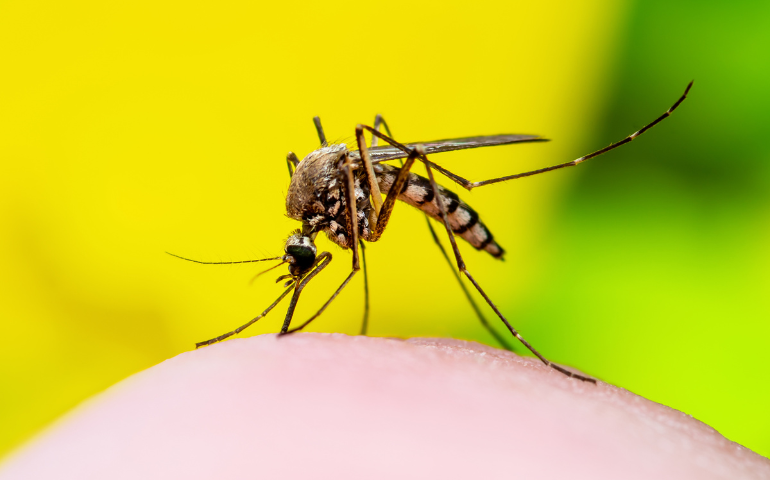
Aedes aegypti (Yellow Fever Mosquito) is a small to medium-sized mosquito, about 4-7 mm in length, with black bodies adorned with distinctive white markings. One of its most recognizable features is the white lyre-shaped pattern on its thorax, and it has black and white banded legs. This species is notorious for spreading diseases such as yellow fever, Zika virus, dengue fever, and chikungunya. It primarily bites during the day, particularly in the early morning and late afternoon, and thrives in urban areas across the southern U.S. and tropical climates.
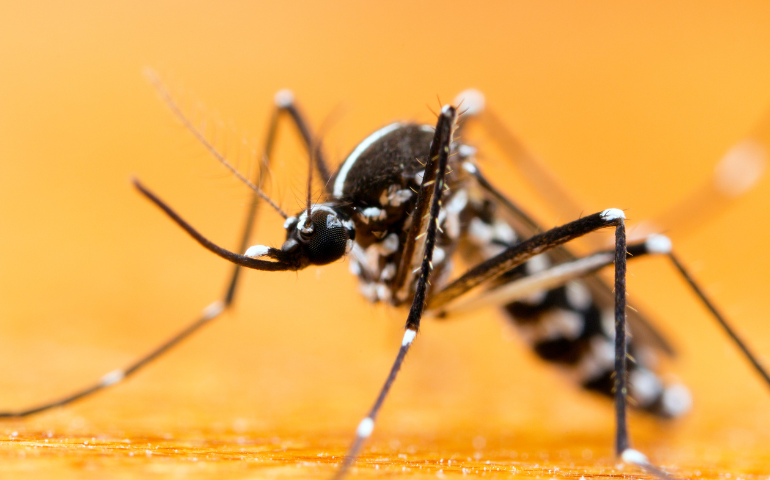
The Aedes albopictus, or Asian tiger mosquito, is slightly larger than Aedes aegypti, ranging from 5-10 mm. It has a striking black body with white bands on its legs and a single white stripe running down the middle of its thorax, giving it its tiger-like appearance. Known for being aggressive day-biters, this species is a major vector of the Zika virus, dengue, and chikungunya. It is highly adaptable, found primarily in the southeastern U.S., but it has expanded to more temperate regions due to its ability to breed in small amounts of water.
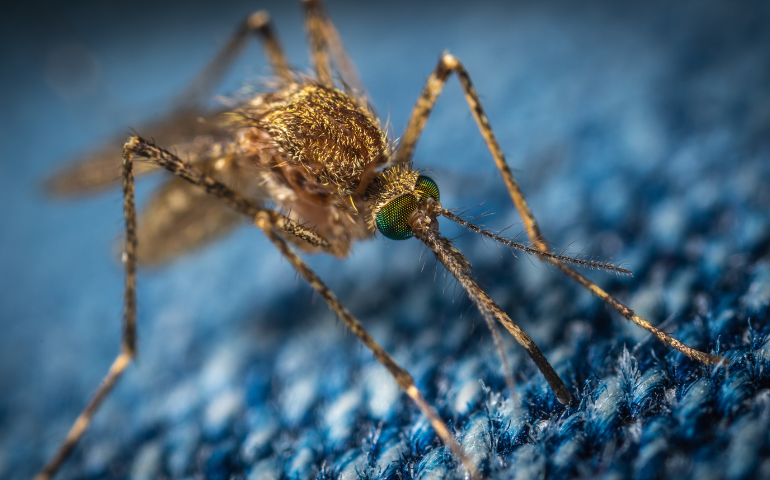
Culex pipiens, also called the Northern House Mosquito, is a medium-sized mosquito, about 4-6 mm in length, with a dull brown to tan body and no distinctive markings, making it less visually striking compared to Aedes mosquitoes. It is known for transmitting the West Nile virus, St. Louis encephalitis, and other encephalitis viruses. Culex pipiens is active at night and commonly found in the northern U.S., where it breeds in stagnant water sources like puddles, storm drains, and bird baths.
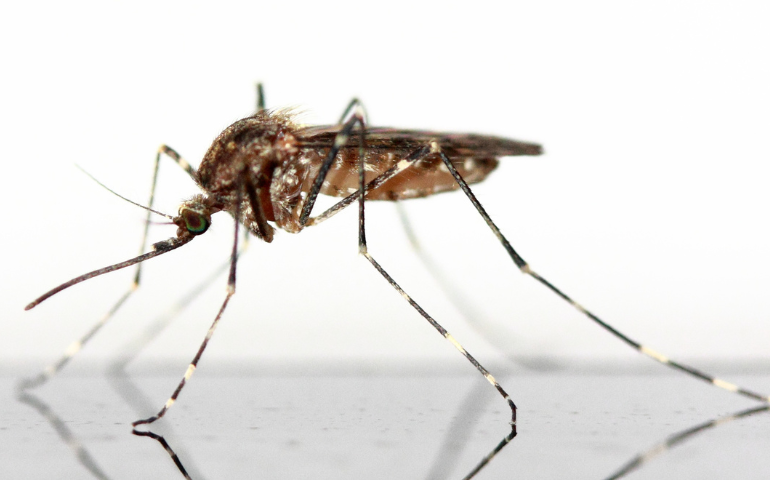
The Culex quinquefasciatus, also called the Southern house mosquito, looks similar to Culex pipiens, with a light brown to tan body and banded legs. Its size is also about 4-6 mm. Known for transmitting West Nile virus and lymphatic filariasis, this mosquito is more prevalent in the southern U.S., where it breeds in warm, stagnant waters. Like other Culex mosquitoes, it bites at night and prefers to feed on birds, though it also feeds on humans, making it a significant public health concern.
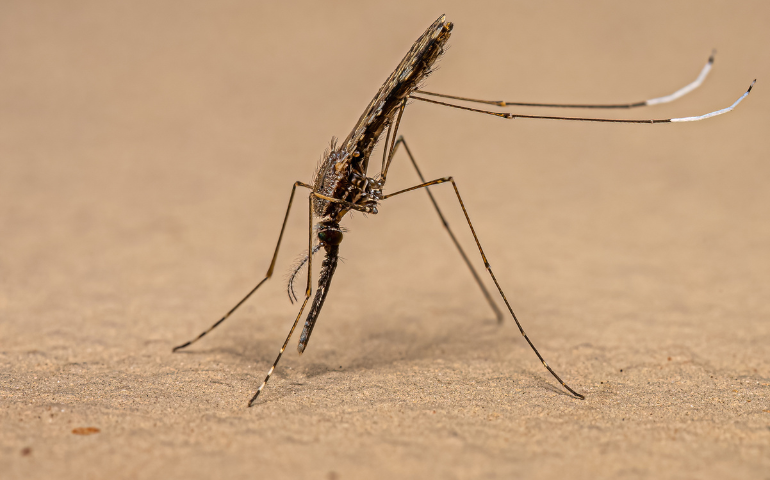
Anopheles quadrimaculatus, or Common Malaria Mosquito, is medium to large, around 4-7 mm in length, and has a dark brown body with pale spots on its wings. Unlike most mosquitoes, Anopheles species rest at a distinctive angle, with their abdomens pointing upwards. This mosquito was once a major vector of malaria in the U.S., though malaria has been largely eradicated in the country. However, it still plays a role in transmitting other diseases like heartworm in dogs. Active at dusk and dawn, Anopheles quadrimaculatus prefers to breed in clean, fresh water sources.
It’s important to note that female mosquitoes are the ones that feed on blood, as they require the proteins for egg development. Male mosquitoes primarily feed on nectar. Additionally, different mosquito species have distinct preferences for breeding habitats, ranging from stagnant water to tree holes and marshes. Understanding the biology and habits of various mosquito species is crucial for effective mosquito control and disease prevention.
Are Mosquitoes Dangerous?
Yes, mosquitoes can be dangerous as they are known vectors for transmitting various diseases to humans and animals through their bites. Some of the diseases transmitted by mosquitoes include:
Malaria:
A life-threatening disease caused by parasites transmitted through the bites of infected female Anopheles mosquitoes. Malaria can lead to symptoms such as fever, chills, headache, and in severe cases, organ failure and death.
Dengue Fever:
A viral infection transmitted by Aedes mosquitoes infected with the dengue virus. Symptoms of dengue fever include high fever, severe headache, joint and muscle pain, rash, and in severe cases, hemorrhagic fever or dengue shock syndrome, which can be fatal.
Zika Virus:
Zika virus is primarily transmitted to humans through the bites of infected Aedes mosquitoes. In pregnant women, Zika virus infection can lead to severe birth defects in newborns, including microcephaly (abnormally small head size) and other neurological complications.
West Nile Virus:
West Nile virus is spread to humans through the bites of infected mosquitoes, primarily species of the Culex genus. While most people infected with West Nile virus do not develop symptoms, some may experience fever, headache, body aches, and in rare cases, severe neurological illness such as encephalitis or meningitis.
Chikungunya:
Chikungunya is a viral disease transmitted to humans by infected Aedes mosquitoes. Symptoms of chikungunya include fever, joint pain, muscle pain, headache, nausea, and rash. While it is rarely fatal, chikungunya can cause long-lasting joint pain and disability in some cases.
These are just a few examples of the diseases transmitted by mosquitoes. While not all mosquitoes carry disease, it’s essential to take precautions to prevent mosquito bites and reduce the risk of mosquito-borne illnesses, especially in areas where these diseases are prevalent. Utilizing mosquito control measures and protective clothing, and using insect repellents can help minimize the threat posed by mosquitoes.
Eliminating Mosquitoes from Your Yard with Alta Pest Control
At Alta Pest Control, we understand the importance of enjoying your outdoor space without the nuisance of mosquitoes. Here’s how we can help you keep your yard mosquito-free:
Expert Prevention and Treatment:
Our professionals are trained to implement effective prevention methods and treat the area to eliminate mosquitoes. With our expertise, we can identify breeding sites and implement targeted treatments to eradicate mosquitoes at all life stages.
Knowledgeable Guidance:
Did you know that a single mosquito can lay up to 100 eggs in a container as small as a plastic bottle cap? Our experts can provide valuable tips and tricks to help you address potential breeding grounds and prevent mosquito infestations in your yard.
Certified Professionals:
While DIY methods like dryer sheets and citronella candles may not offer reliable mosquito control, our certified professionals have the expertise and tools to deliver results. We follow label instructions and apply treatment solutions correctly to ensure maximum effectiveness.
Tailored Solutions:
Every yard is unique, and so are its mosquito control needs. We partner with you to identify problem areas and develop customized solutions to meet your specific requirements. Our ongoing services ensure that your yard remains mosquito-free year-round.
Don’t let mosquitoes ruin your outdoor experience. Trust Alta Pest Control for expert mosquito control solutions tailored to your needs. Contact us today to schedule a consultation and take back your yard from these pesky pests.
